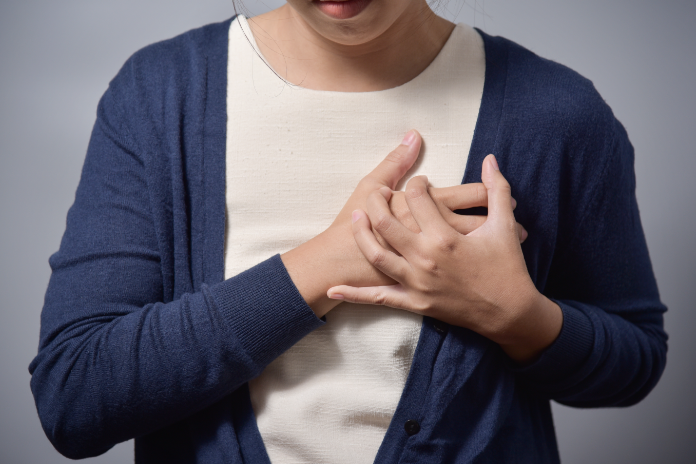Few things can cause a parent’s heart to stand still. One of them is having a teenager complain of chest pain. Unfortunately, it’s a common complaint. Pain can range from dull to numbing pain. Thankfully, there’s no need to worry if it is diagnosed early and receives treatment.
In This Article:
- Chest Pain In Teenagers
- Causes For Chest Pain In Teens
- Signs/Symptoms Of Something Serious
- Treatment For Pain In The Chest
- When To See A Doctor?
- Prevention Tips
Chest Pain In Teenagers
A variety of factors can cause a teenager to feel pain in the chest. In many cases, chest pain is not necessarily caused by a heart problem. It could be related to respiratory, muscle, bone joint, gastrointestinal, or mental health conditions. Often the pain will go away on its own but make sure to talk to the doctor.
Causes For Chest Pain In Teens
Chest Wall Pain
The most likely and common cause in teens is chest wall pain. The chest wall includes the skin, fat, muscles, and bones. This wall forms a protective structure around the heart, major blood vessels, lungs, and esophagus. The bones of the chest wall are the ribs, sternum (breastbone), and spine. This pain can also result from rib trauma or sore muscles due to chronic pain syndromes such as fibromyalgia.
Costochondritis
A leading cause of chest pain in teens is costochondritis. It is inflammation of the cartilage that connects a rib to the sternum, causing sharp pain which worsens with a deep breath. It usually has no apparent cause which can last for several weeks or longer.
Gastroesophageal Reflux Disease
Deeper in the chest is the esophagus, concerned with pain in the chest. Teens can have gastroesophageal reflux disease (GERD). It’s a common symptom of heartburn which occurs when stomach acid flows backward and irritates the lining of the esophagus. Symptoms commonly occur after eating or when lying down at night.
Stress, Anxiety, and Panic Attacks
Mild body connection stress, anxiety, and panic attacks can all cause chest pains. Panic attacks are dreadful and include rapid heartbeat, shortness of breath, sweating, nausea, dizziness, and a fear of dying.
Other Organs
Less often, chest pains in teens can be related to the lungs, heart, or blood vessels. For example, pneumothorax is a condition in which there is sudden collapse of a lung without any apparent cause. Symptoms are sudden onset of pain in the chest leading to shortness of breath. Pericarditis is known as the inflammation of the membrane surrounding the heart. It leads to a sharp pain which gets worse with breathing deeply and lying down. Usually, a virus is a cause.
Genetics
When it comes to such pain, genetics count. Inherited conditions like factor v Leiden mutation can lead to a pulmonary embolism a blood clot that travels from a leg and lodges in a lung. Symptoms include pain in the chest that worsens with breathing deeply, shortness of breath, and cough.
Hypertrophic Cardiomyopathy (hcm)
HCM is a usually inherited disease in which the heart muscle becomes abnormally thick. Teens may experience pain in the chest, shortness of breath, or an irregular heartbeat (arrhythmia). Due to arrhythmia, hcm is the most common cause of heart-related sudden death in athletes. Any teen with a family member who has hcm should be screened for it by a doctor.
Inherited Syndromes
Certain inherited syndromes including Marfan, Ehlers-danlos, and Turner can lead to aortic root dissection, another life-threatening condition that causes pain in the chest. In aortic root dissection, the inner layers of the main artery of the body separate. The aorta then ruptures causing sudden severe pain in the chest with a tearing or shearing sensation.
Signs/Symptoms Of Something Serious
- Very intense or severe
- Pain is recurring and worsening
- Long-lasting
- Triggered by physical activity or exercise
- Accompanied with fever or other symptoms such as dizziness, shortness of breath, or fainting
Treatment For Pain In The Chest
Typically chest wall pain is not treated with medications. However, chest wall injuries and inflammation can respond to nonsteroidal anti-inflammatory medications such as ibuprofen. Otherwise, treatment for the pain will be dependent upon its cause.
When To See A Doctor?
Even though chest pains in teenagers are usually not serious, it’s important to take it seriously. If it’s severe and sudden contact the doctor. The doctor will take a complete history and perform a physical examination. Tests like ECG and chest x-ray are done.
Prevention Tips
As such, there is no prevention but getting the cause diagnosed early can treat the teen. The doctor will perform certain tests for proper treatment.
Conclusion
There are many causes for teens experiencing pain in the chest. Many of the causes are not long-lasting or life-threatening. Some conditions are more serious and should be diagnosed by the doctor.
References –
- Chestpain in children and teenagers | children’s hospital of Philadelphia (chop.edu)
- Should you worry about your child’s chestpain? – health essentials from Cleveland clinic
